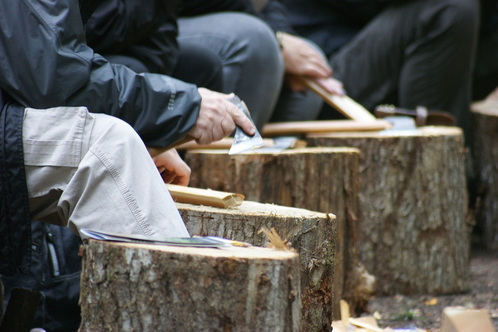http://www.canberra100.com.au/programs/city-of-trees/
|
Part of the City of Trees project by UK artist Jyll Bradley reflecting upon "Canberra’s 100 years through an exploration of the city’s remarkable tree-scapes". This includes 7 audio pieces, (linked to a map of the city) By Jyll Bradley with Jonquil Panting (BBC Radio Producer). Music by Michael Sollis, performed by The Griffyn Ensemble
http://www.canberra100.com.au/programs/city-of-trees/
0 Comments
Our third workshop took place on the 11th -12th of September at The Forest of Dean. We worked with the Wye Valley AONB and Wildwood Coppice Crafts to think through how a performative and experiential research approach might be extended to working with trees. This is the fifth in a series of reflections on the workshop from our participants and is written by Deirdre Heddon. Prologue: Astrov: […] All right, I grant your point – cut the timber if you need it. But why ruin the forests? The forests of Russia are crashing down before the axe, millions upon millions of trees perish, the homes of birds and beasts are devastated, rivers grow shallow and dry up, wonderful scenery disappears without trace, and all because man’s so lazy […]  Act 1: We sit in a circle in the forest, each upon a tree’s trunk. David is demonstrating – patiently – how to create a spoon from a block of wood. Imagine the shape of the spoon, he tells me. It’s within your block of wood. I marvel at the spoon shapes others manage to make, their commitment, persistence, focus, capacity. I can’t see the spoon for the tree. It’s a cherry tree. It’s a small log. It’s a spoon, though not in my hands. I have hands like logs. Act 2: I wander off into the forest. I worry about getting lost. I find myself staying close to the path we walked earlier, as a group. I find myself back at the tree I stopped at then. I force myself to move on, to move off, to find another tree, a different perspective. I lie on my back, looking up in to the tree’s canopy, stretching hundreds of metres above me. I close my eyes. I listen. Bird song up high, buzzing bees near my ears, airplane traffic, a chainsaw some kilometres distant, the patter of rain drops like a drum above me, the soft rustle of leaves in the wind. Talking leaves. Act 3: We are back in our circle, on the tree logs. We are reflecting on our experiences of the past two days. It is loud. We are loud. We are talking over each other, not listening, not listening properly, not taking time to listen, not hearing. Conversation – dialogue – dialogic – reciprocity – exchange. How can we humans converse with trees when we struggle to converse with other humans? I worry that the shift-pull to the more-than-human is symptomatic of the failure of – or an exhaustion with the challenge of – the human-to-human. Less talking, more listening – ways to listen, to hear, to resonate. I am touching sound, being touched by sound. I am a resonating chamber. My body is attuned. I tremble. Behold. Behear. Sounds travel. They move. They carry. And they spill over the edge, escaping the circumference, breaking the horizon. [horizon: Origin: 1540–50; < L horizōn < Gk horízōn (kýklos) bounding (circle), equiv. to horíz(ein) to bound, limit. The horizon is a border, a boundary, the dividing (or meeting) line between sky and earth.] * Epilogue: Astrov: [… Pointing to the map] Now look at this. This gives a picture of our district as it was fifty years ago. Dark green and light green stand for woodlands, and half the entire area was wooded. Where I have this red cross-hatching over the green, that was the home of the elk and wild goat. I show both flora and fauna. This lake here was the home of swans, geese and wild duck, and they made ‘a powerful lot of birds’, as the old peasants say, no end of them – whole clouds swarming overhead. […] Now let’s look lower down and see what things were like twenty-five years ago. Here only a third of the area’s under timber. There are no more wild goats, but there are still some elk. The green and blue colouring is less in evidence. And so it goes on, so it goes on. Now let’s move on to part three, a picture of the district as it is today. There are odd bits of greens here and there in patches, but no continuous stretches. The elk, swans and woodgrouse are no more. The old hamlets, farmsteads, hermitages and mills have vanished without trace. The general picture is one of a graduate and unmistakable decline, and it obviously needs only another ten or fifteen years to become complete. * From Deirdre Heddon, ‘The Horizon of Sound: Soliciting the Earwitness’, Performance Research, 15 (3). pp. 36-42
|
Archives
October 2018
Categories
All
Links
Animal Computer Interaction |
 RSS Feed
RSS Feed
